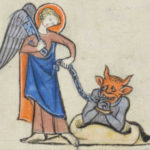We run our website the way we wished the whole internet worked: we provide high quality original content with no ads. We are funded solely by your direct support. Please consider supporting this project.

The Problem with Naming People’s Sin
Jesus told a woman caught in adultery: “Go and sin no more” (John 8:11). Since Jesus said this, does this give the church the right to tell people not to sin?
It’s one thing for Jesus, who “knew no sin” to say this and quite another for people like us—with tree trunks protruding out of our eyes—to say the same thing. The central point of the story where Jesus says these words is that none of her accusers were in a position to judge her. Jesus invited whoever was without sin to cast the first stone, but no one met that requirement. They were as much sinners as she.
Jesus, the only one who was qualified to condemn the woman, did not do so. Rather he told her to abstain from this sinful activity.
Here’s the lesson: if you want to judge someone else, you first have to be sinless. But if you are sinless, like Jesus, you won’t have any inclination to do so.
But what about the time that Jesus told the Samaritan woman that she had five husbands and was living with a man who was not her husband (John 4:16-18)? Doesn’t this mean that Jesus was setting a model for naming people’s sins?
Jesus didn’t mention this information to judge this woman. The only reason he let this woman know that he was aware of her past was to convince her that he was the Messiah. If this woman would “drink” the water he had to offer she would never thirst again. Even though he knew about her past, the offer of “life” was still on the table, no questions asked!
Had there been any shame or judgment involved, meeting a man who knew everything about her would hardly have been a joyful encounter. However, she went back to her town and joyfully proclaimed what she had heard.
Jesus did not try to fix people’s moral lives. He loved people and offered them everlasting life as they are, regardless of their moral lives. Whatever transforming impact God’s love has on people, it has incredible power because it is given before—and apart from—the transformation itself.
This is how we are called to love. We are to be the shadow that Jesus casts—to imitate God by “living in love, as Christ loved us and gave himself for us (Eph 5:2). We are to demonstrate the kingdom of Calvary-like acts of service and then proclaim the message of God’s kingdom.
We are to serve, no questions asked. We are to love before they are transformed—even our enemies—with a nonjudgmental love to all who are thirsty. To do this we must refrain from doing what Jesus never did: namely positioning ourselves as wiser, morally superior, or the “fixer” of others.
—Adapted from The Myth of a Christian Nation, pages 130-132
Related Reading

Did the Fall Really Happen? (podcast)
Greg speculates on the nature of the fall, then talks about evidence of God in the universe. Episode 520 http://traffic.libsyn.com/askgregboyd/Episode_0520.mp3

Is it okay to masturbate?
When I as a new struggling Christian raised this topic with my pastor, I was told in no uncertain terms that God struck Onan dead for masturbating. At some point I read the passage for myself (Gen. 38:1-10) and discovered my pastor had mislead me. It’s true that Onan was punished by God because he…

Podcast: What Do You Mean When You Say Jesus Entered Into Solidarity with Our Sin?
Greg talks about God’s passion for, unity with, and pursuit of his beloved bride. http://traffic.libsyn.com/askgregboyd/Episode_0330.mp3

Worst Sinner Award
Jesus taught: Do not judge, or you too will be judged. For in the same way you judge others, you will be judged, and with the measure you use, it will be measured to you. Why do you look at the speck of sawdust in your brother’s eye and pay no attention to the plank…

Sinful Accusers and Capital Punishment
The Pharisees brought to Jesus a woman they had caught in the act of adultery (Jn 8:3-4; where was the guilty man?). They wanted to see how this increasingly popular, would-be Messiah, might respond. Their motive, of course, was to entrap Jesus (vs. 6). The law explicitly commanded that adulterers had be stoned to death…

Podcast: How Does God Judge?
Greg looks at the revelation of how God judges as demonstrated on the cross. http://traffic.libsyn.com/askgregboyd/Episode_0089.mp3
